2
2 Broadcaster Press
July 28, 2015 www.broadcasteronline.com
Without Missing A Beat WW II Vet Gives Rare
Drum Set To The National Music Museum
Vermillion, South Dakota (20 July 2015) -- There
wasn’t a dry eye in the exhibit hall at the National
Music Museum in Vermillion recently, as 90-yearold World War II vet and life-long drum enthusiast
Roger L. Kehm sat down to skillfully play, one last
time, on his vintage 1942 Slingerland “Radio King”
drum set, before donating it the NMM.
It was an understandably emotional moment
for Mr. Kehm. “This drum set was really special to
me. I have so many great memories of playing,”
he said. Kehm has played since he was 17 (which
would seem to confirm popular claims about
drumming’s long-term cardiovascular and intellectual benefits).
A Sioux Falls native, Kehm purchased his Radio King drum set from the John Sampson Drum
shop in Sioux Falls before he graduated from high
school in 1942. While anticipating being drafted,
Kehm and some of his buddies organized a small
dance band, playing for dances at the Sioux Falls
USO. He also played with the Varsity Club dance
band at South Dakota School of Agricultural and
Mechanical Arts (now South Dakota State University) in
Brookings, before being drafted in 1943. Kehm served
in the U.S. Coast Guard, stationed on the South Pacific
islet of Atafu, working on the then-secret Loran (Long
Range Aids to Navigation) program.
After the war, Kehm enrolled at the South Dakota
School of Mines, Rapid City, where he played with the
Clyde Keyes Combo and the Sophisticated Swingsters.
As a veteran, Kehm continued to play his drums professionally for several decades at American Legion Clubs,
VFW halls, and other regional venues. He performed for
many years with the Milt Askew Orchestra at the Arkota
Ballroom in Sioux Falls.
Introduced between 1936 and 1937, the “Radio King”
was Slingerland’s flagship product. Unlike other drums
of the era that were built with layers of wood, the
“Radio King” sported drumshells made of steam-bent
maple. Kehm’s drum set includes a bass drum/footpedal/spurs, a snare drum, two cymbals, wood block,
cow bells, two tom-toms, and a Hi-Hat cymbal stand.
The Radio King was Slingerland’s most famous product
line through the mid-1950s.
Until Labor Day 2015, Kehm’s beloved rare drum
set will be part of the World War II section of the
NMM’s special summer exhibit “Banding Together: The
American Soldiers’ Musical Arsenal.” After the exhibit
comes down, the drum will take its place in the NMM’s
outstanding antique and vintage drum collection.
At press time, the NMM’s Facebook post about Mr.
Kehm’s drum donation had surpassed 63,300 Facebook views, making it the most viewed, most liked,
DARA LOHNES most shared, and most commented on
Roger Kehm donating his beloved 1942 “Radio King” drum set to National Music Museum Facebook post ever.
the National Music Museum, Vermillion, South Dakota, June 2015
Partner Proposals To Protect And Restore
Critical Wetlands In South Dakota
HURON – The Natural
Resources Conservation
Service (NRCS) announced
the availability of $17.5 million in financial and technical assistance nationwide to
help eligible conservation
partners voluntarily protect,
restore and enhance critical
wetlands on private and
tribal agricultural lands.
“USDA has leveraged
partnerships to accomplish
a great deal on America’s
wetlands over the past two
decades, said Chad Kacir,
Acting State Conservationist with NRCS. “This year’s
funding will help strengthen
these partnerships and
achieve greater wetland
acreage in South Dakota and
throughout the nation.”
Funding will be provided
through the Wetland Reserve
Enhancement Partnership
(WREP), a special enrollment
option under the Agricultural Conservation Easement
Program’s Wetland Reserve
Easement component. It is
administered by the Natural
Resources Conservation
Service (NRCS). Under
WREP, states, local units of
governments, non-governmental organizations and
American Indian tribes col-
laborate with USDA through
cooperative and partnership
agreements. These partners
work with willing tribal and
private landowners who
voluntarily enroll eligible
land into easements to
protect, restore and enhance
wetlands on their properties.
WREP was created through
the 2014 Farm Bill and was
formerly known as the Wetlands Reserve Enhancement
Program.
Wetland reserve easements allow landowners to
successfully enhance and
protect habitat for wildlife on their lands, reduce
impacts from flooding,
recharge groundwater and
provide outdoor recreational
and educational opportunities. The voluntary nature of
NRCS’ easement programs
allows effective integration
of wetland restoration on
working landscapes, providing benefits to farmers and
ranchers who enroll in the
program, as well as benefits
to the local and rural communities where the wetlands
exist.
Proposals must be submitted to NRCS state offices
by July 31, 2015. Projects
can range from individual to
watershed-wide to ecosystem-wide. Under a similar
program in the 2008 Farm
Bill, NRCS and its partners
entered into 272 easements
that enrolled more than
44,020 acres of wetlands
from 2009 through 2013.
Most of these agreements occurred through
the Mississippi River Basin
Healthy Watersheds Initiative (MRBI). In South Dakota,
parts of Roberts and Grant
Counties are in the MRBI
area. Through partnerships,
MRBI identifies high-priority
watersheds where focused
conservation on agricultural land can make the most
gains in improving local,
state and regional water
quality. The new collaborative WREP will build on
those successes by providing the financial and technical assistance necessary for
states, non-governmental
organizations and tribes to
leverage resources to restore
and protect wetlands and
wildlife habitat.
Through WREP, NRCS will
sign multi-year agreements
with partners to leverage
resources, including funding,
to achieve maximum wetland restoration, protection
and enhancement and to create optimum wildlife habitat
on enrolled acres. WREP
partners are required to
contribute a funding match
for financial or technical
assistance. These partners
work directly with eligible
landowners interested in enrolling their agricultural land
into conservation wetland
easements.
This announcement
builds on the roughly $332
million USDA has announced
this year to protect and
restore agricultural working lands, grasslands and
wetlands. Collectively,
NRCS’s easement programs
help productive farm, ranch
and tribal lands remain in
agriculture and protect the
nation’s critical wetlands
and grasslands, home to
diverse wildlife and plant
species. Under the former
Wetlands Reserve Program,
private landowners, tribes
and entities such as land
trusts and conservation
organizations enrolled 2.7
million acres through 14,500
agreements for a total NRCS
and partner investment of
$4.3 billion in financial and
technical assistance.
Visit NRCS’s ACEP webpage to learn more about
NRCS’s wetland conservation options.
Home Country
CHEVROLET
BUICK - GMC
SLIM RANDLES
JerrysCars.com
Over 15 Vehicles
UNDER $10,000 &
10 Vehicles UNDER $6,000
209 W. Cherry St., Vermillion
605-624-4438
Two Locations
to Serve You!
Locally Owned and Operated Since 1972
3211 E. Hwy. 50 • Yankton, SD
605-665-4540-• 800-526-8095
745 E. Hwy 46 • Wagner, SD
605-384-3681 • 800-693-1990
O r v i s i t u s a t : w w w. m a r k s i n c . c o m
Doc was the first one in at
the Mule Barn truck stop this
morning, so he got to pick,
and he chose the round table
instead of the philosophy
counter. If you asked him
why, he couldn’t tell you, but
some days are just round
table days, while others
lend themselves to counter
proposals.
In 15 minutes the round
table had a quorum of homespun philosophers, practical
FOR RENT
4 Bedroom home acreage
for rent August 1st
Beresford Area, 20 minutes
from Vermillion.
Quonset, 2 car garage, many updates.
Call 605-360-9656 or 605-334-1816
Join Us!
Retirement Open House
for
Joyce Kayl
Stop in to celebrate Joyce Kayl and
her retirement after 32 years with
CorTrust Bank.
Open House
Wednesday, July 29th
1:00 PM - 5:00 PM
101 W Main St • Vermillion
Raise your expectations.
Member FDIC
624.4461
cortrustbank.com
jokers, and scientific greatness.
“Puts me in mind,” said
Bert, “of the time we were
in the mountains and I was
suddenly surrounded by a
mountain lion.”
“So what did you do
about it, Bert?”]
“I died, of course.”
Cracker packets flew.
While Bert was returning
the packets to the packet
container, Herb picked one of
them up and examined it.
“Stealth,” he said.
“What’s that, Herb?”
“Stealth. These cracker
packets, I mean. Just have a
look at them. See how they
are designed, so that the
crinkles on the flat side are
just crinkly enough so the
radar won’t bounce back a
strong signal? And of course
if the packets are flying sideways, there’d be no discernible bounce at all.”
“Stealthy cracker packets?” said Doc.
“Well sure. You noticed
how each of us was able to
make a direct hit on ol’ Bert
there? He had no warning.
Design is everything, isn’t
it?”
Cracker packets flew once
again. Good thing Herb’s
radar was turned off or we
wouldn’t have scored as
many hits as we did.
---------Keep up with the world
dilemma think tank on the
Home Country podcast.
http://starworldwidenetworks.com/index.php/musicstarworldwide
Tell them
you saw it
in the
Broadcaster!

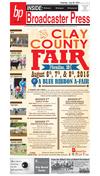
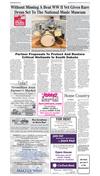
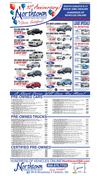

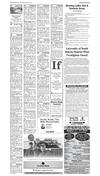
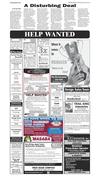
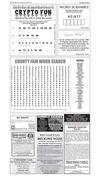
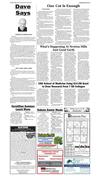
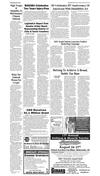

 Previous Page
Previous Page





